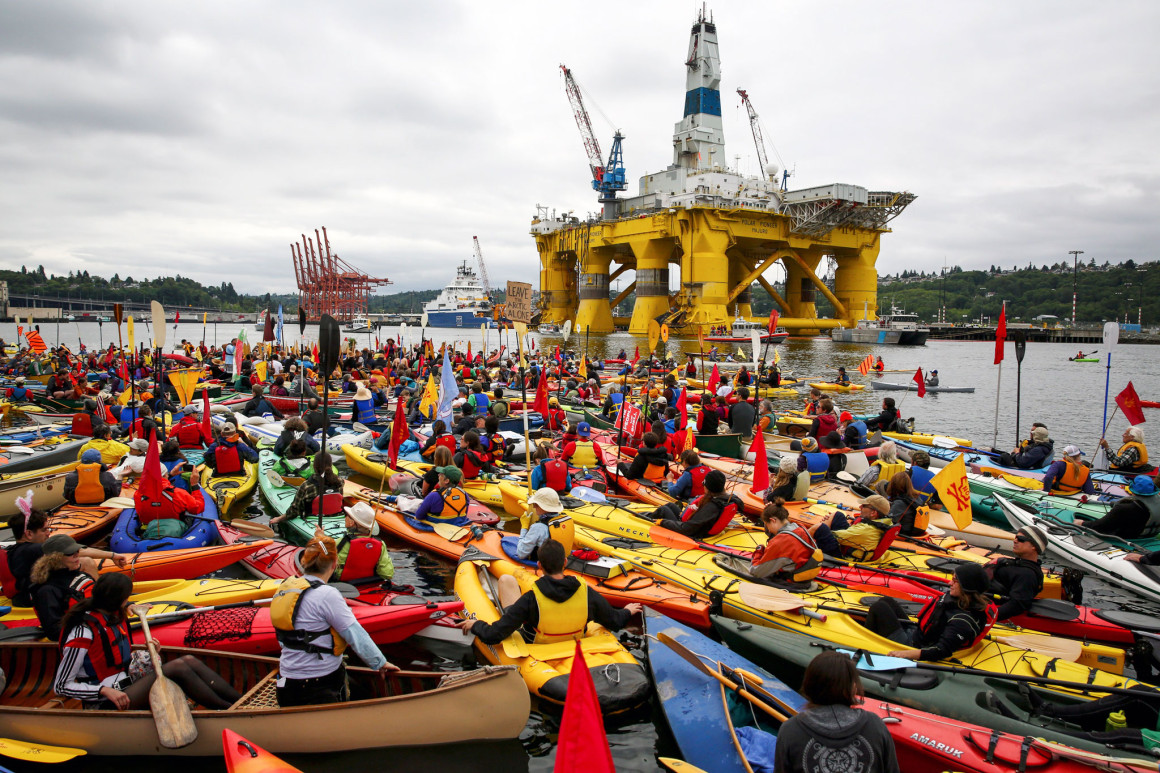
Arctic oil exploration in spotlight as scientists study effects of spills
By Fabian Mayer, August 6 2015 —
Debates over oil production in the Arctic erupted this spring when oil company Royal Dutch Shell sent two exploratory drilling rigs to the Chukchi sea northeast of Alaska. More recently, a Shell icebreaker faced Greenpeace activists dangling from a bridge and environmentalists in kayaks trying to stop the ship from heading north.
For organizations like Greenpeace, the Arctic represents a pristine environment and one of the last places on earth relatively untouched by human development. But for oil companies, it is the last and greatest untapped reserve of fossil fuels on the planet. The U.S. Energy Information Administration estimates the Arctic “could hold about 22 per cent of the world’s undiscovered conventional oil and gas resources.”
University of Calgary political science professor Rob Huebert specializes in Arctic politics. He expects Arctic oil exploration to increase in the future, pointing out that Shell’s operations are just one part of a global push to produce Arctic oil.
“In December of 2013 the Russians actually started production. What Shell’s doing is just exploration and that’s a continuation of what was happening off of Greenland, other parts of Russia and parts of Norway,” Huebert said.
Huebert highlighted the various interests and complicated politics of potential Arctic oil production. Multinational oil companies clash with environmental groups, while northern communities and aboriginal groups are often split on the issue.
Inuit activist Sheila Watt-Cloutier opposes any development of Arctic fossil fuel reserves out of concerns over climate change. On the other hand, former premier of the Northwest Territories and current chair of the Inuvialuit Regional Corporation Nellie Cournoyea favours development as long as certain conditions are met and northern communities benefit.
“A lot of the northerners, whose regions is going to be most affected, there are those that are in favour of it,” Huebert said. “They turn around and say ‘why should southern-based environmental group like Greenpeace have a say in their future.’”
There is currently relatively little activity in the Canadian Arctic, partly as a result of low oil prices. But Huebert thinks this could change in the near future.
“We lag behind the Americans, but the moment the price of oil starts going back up to $80–90 a barrel, you’re going to see substantial reinvigoration,” Huebert said.
Activity in Canadian waters will likely be concentrated in the Beaufort sea in the western Arctic.
Many of the concerns shared by both environmental and aboriginal groups stem from the risk of oil spills that offshore drilling brings. They argue that a spill similar to the 2010 Deepwater Horizon oil spill in the Gulf of Mexico would be even more disastrous in the Arctic.
Huebert believes the amount of time people have had to think about Arctic oil drilling has resulted in strict regulatory regimes.
“My impression is that the environmental standards are as high if not higher than what you see elsewhere,” Huebert said. “Everyone is super aware that if you make a mistake in the Arctic, you’re going to pay a lot higher price.”
Researchers are just beginning to study the effects of an oil spill in the Arctic. The federal government recently announced plans to build a research facility in Churchill, Manitoba designed to study the detection, impacts and mitigation of Arctic oil spills.
Two U of C researchers will be a part of the project. Geographer John Yackel will lead sea ice remote sensing research, while biology professor Casey Hubert will study hydrocarbon degradation.
Hubert, who studies the extent that microbes can help clean up oil spills, said there are many unknowns when it comes to potential oil spills in the Arctic.
“The sea ice component is probably the biggest difference,” Hubert said. “What if the oil’s on top of the ice? What if the oil is accumulating under the ice? Those would be new variables that haven’t been investigated elsewhere.”
Hubert was reluctant to take a position on Arctic oil extraction, but recognized the controversy surrounding the topic.
“It’s an environment that is pretty pristine and there’ a lot of interest and concern in the Arctic staying that way,” Hubert said.
He hopes there will be a national debate and discussion on the topic, adding that the impacts of further fossil fuel production on climate change must also be considered.
According to Hubert, the research undertaken at the new facility doesn’t take a position on Arctic oil production. But he said the increased shipping activity in the Northwest Passage makes this important research — regardless of how many oil rigs are operating in Canada’s north.
“Even if we decide not to explore for oil in the Canadian Arctic that doesn’t eliminate the possibility of the kinds of spills we’re trying to study.”
